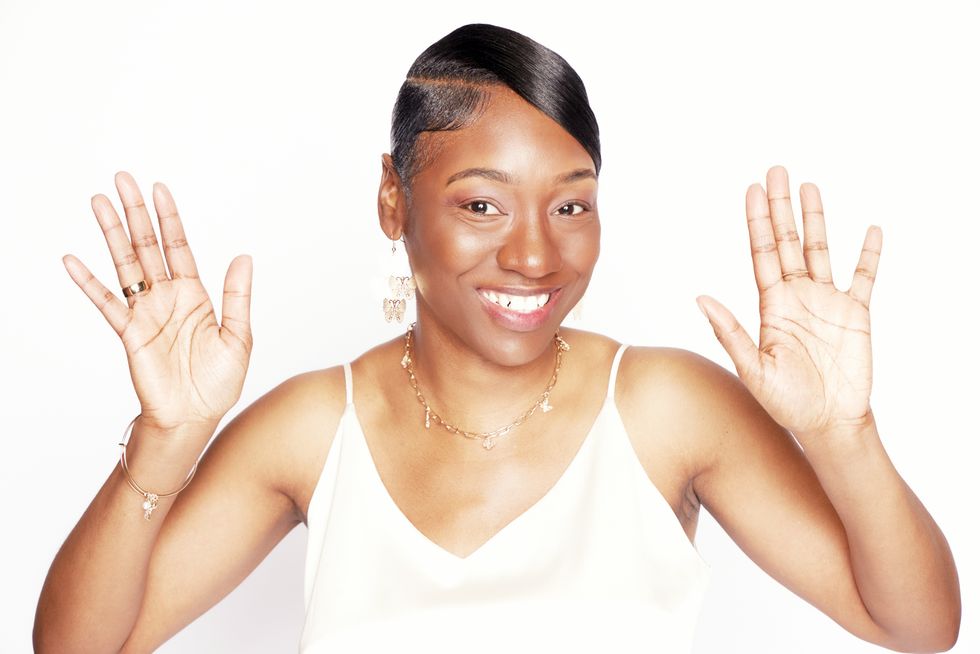How This Woman Paid Off Over $90,000 Worth Of Debt Without Drastically Changing Her Lifestyle

With 2024 around the corner, a lot of us are starting to think about future goals. What new ideas do I want to bring to life, or what am I currently working on that needs improvement? I’ll be transparent in saying that improving my finances has been an ongoing challenge. I mean, sure, I’m generally stable. But “stable” isn’t enough to invest how I’d like or significantly save as desired. And while it’s not everyone’s favorite subject to bring to the dinner table, I realize a lot of my peers are facing the same problem. Especially in this economy, chile.
That’s why I was super excited to speak with personal finance coach, author, and certified financial instructor Rachael Hanible, a 36-year old Philly-native who has paid off over $92,000 in debt, saved a year's worth of her income, and sports a credit score of 846. In this conversation with xoNecole, she shared her finance journey, along with a few helpful tips for the girlies trying to make money moves (cues, Cardi B).
First, I have to say paying off over $90,000 worth of debt is amazing. Can you tell me a little bit about that journey? How did you cultivate it, and when was the moment you knew you wanted to change your situation?
It was a mixture of a few things. There was some student loan debt there. Plus, I had a car note and credit card debt. I grew up poor, but I never felt like that was God’s plan for my life. I always said I was a millionaire-in-training and spoke about the things I’d do when I’m wealthy. And I woke up one day with an idea of being debt-free, even though I didn’t know anyone who was. I was in school working at a convenience store, making $8/hr. when I had the bright idea. But after I finished college, I revisited the thought, and that’s when the plan started.
"I grew up poor, but I never felt like that was God’s plan for my life. I always said I was a millionaire-in-training and spoke about the things I’d do when I’m wealthy. And I woke up one day with an idea of being debt-free, even though I didn’t know anyone who was."
So many of us want to do that but struggle to make it a reality. What was your process?
I got a job doing accounting after my college job. One day, I just calculated all of my debt and discovered how much was being added to my student loan daily. In my mind, I just wanted to cut down the days that I owed that money, and I applied the same principle to my car note. I started with an extra $5 to my student loans and an extra $20 to my car note. And I was consistent with that idea as I continued to find and grow more income. Now I’m almost 13 years in with no car payment and 11 years with no student loan debt.
Did you always have a good relationship with money?
No (laughs). I went to school for business law, and one of my first assignments was to get a subscription to Wall Street Journal, but I held on to it after the assignment. I started to read about investing, ROTH IRAs, and more. They were mentioning words I never heard before, and that started my journey to learning more.
Just curious, what was your biggest splurge before you got here?
Probably shoes. I have over 100 pairs of shoes (laughs).
You gotta treat yourself sometimes, right?
Girl, not that much (laughs).

Photo courtesy of Rachael Hanible
Well, did you ever work any crazy jobs to get by?
Nothing too crazy because I’ve always been big on integrity over income. But I used to teach Excel classes in my apartment. People from churches would send their registration list, I’d reach out, and they’d come to my little one-bedroom and learn.
It’s giving hustler more than crazy, but I can appreciate the full-circleness of it all. Because, today, how much do you save monthly?
Right now, my major goal is to pay off my 30-year mortgage in eight years, and I have one more year to go. So I’d say I’m averaging about $3K a month toward saving or putting toward my home loans.
That’s incredible. But I’m curious – it’s hard enough to shift your finances the way you did. What triggered you to transform this skill into a business?
For years, I was helping people, and that continued to grow. People actually told me I should start charging – so I did.
You offer a lot more, though, right? Talk to me about your multiple streams.
Yes, it started with that one thing: talking and helping people. But when you solve one problem, people will send you bigger problems. So, it developed into classes for kids. Those sessions start at age three and go all the way to college-aged. Also, I’m an author and teach about real estate, budgeting, and credit.
What’s been your biggest business challenge so far?
Even though it's a sexy subject now, no one wanted to talk about this years ago. In the beginning, people didn’t wanna hear from a Black woman with no kids and no husband about financial literacy. For whatever reason, people felt like those things didn’t make me relatable. Like, of course, she can do this if she doesn’t have kids. It was difficult; that was something I really had to fight through.
Ugh, that's ridiculous. Did you have a person or tribe to confide in? Who do you talk to?
Yes, I talk to my mom. She’s a pastor. Then there’s my big sister, who is a mixture of the church and the streets and, of course, my best friend. She’s all the way left (laughs). I come to them for business and relationships. They are all fair and give me encouragement.
From working with diverse clientele, have you picked up on any popular unhealthy spending habits?
The habits are connected to the mindset. The mindset controls your access. Unfortunately, a lot of us don’t feel like freedom, luxury, or wealth is for us. Whether we have $5 or $5,000. I think once we shift that mindset, we’ll be able to hold on to it more.
"The habits are connected to the mindset. The mindset controls your access. Unfortunately, a lot of us don’t feel like freedom, luxury, or wealth is for us. Whether we have $5 or $5,000. I think once we shift that mindset, we’ll be able to hold on to it more."
How would you define wealth?
I define wealth as freedom and options. There are people waking up to do things they don’t want to do because they need the money and people going to sleep not doing what they want because they don’t have the money. Wealth is being able to make decisions when and how you want.
Okay, it’s time for you to teach us your ways. What investments do you currently have? Can you give us exact names?
Sure, I have a traditional 401k, Roth IRA, brokerage account, and a high-yield savings account. And every month, money goes into everything I just mentioned.
When it comes to investing, I’ve heard conflicting advice. Some people say you should start making investments as soon as you have consistent money coming in, and others suggest waiting and building more first. What’s your perspective?
I think we should have an emergency fund, especially now. You need something you can access quickly. For my clients, I always suggest setting a freedom number in case something happens. And then, after that, we do an even split of investing and saving. Inflation isn’t going anywhere, so we have to make our money grow.
"Inflation isn't going anywhere, so we have to make our money grow."

Photo courtesy of Rachael Hanible
And when it comes to budgeting, how detailed do we need to be?
Very. There are so many of us that work so hard for our money and don’t know where it’s going. Small things can go a long way. A lot of us are throwing small amounts of money away every day; that can add up, especially if you’re living paycheck-to-paycheck or have big goals.
What needs to be included on that budget? Can you share a must-have?
Build for fun in your budget now and freedom for the future. You need a healthy balance for it to be successful and realistic.
Do you have a money mantra that you swear by?
I still say I'm a millionaire-in-training. Now I have all my kids in class saying that. And I end all my classes by reminding people that even though they now have the knowledge and inspiration, only they can make the decision to change.
What’s been your biggest lesson through this process?
God takes care of the people who take care of His people. When I first started, I didn’t have the jazzy marketing and photo shoots, but people could tell my heart was connected to this. And I think that’s why, after ten years, I’m still getting new clients, contracts, and etc. There’s so much content about how to make your business grow, but the most important thing is to care and be passionate about what you’re doing.
What advice would you give to aspiring entrepreneurs?
Do something that you would do for free. People say you’ll never work a day in your life if you’re doing what you love. That’s not true. There’s gonna be some piece of your purpose that you’re not gonna like. But if you’d do it for free, that will tell you everything about longevity and if you’re doing it from your heart.
Things you’re gonna learn: taking the stairs is essential. If you try and take the fast lane, you’re gonna get to some levels you’re not prepared for. So, do it for free first and take the stairs.
Finally, what is your ultimate saving goal?
I don’t want any debt. Also, being able to make sure my mom is comfortable – she’s had some health challenges. I want to be able to do what I love without worrying about bills, and I want to be able to serve the people and not count pennies in the process.
I think it’s safe to say she’s well on her way.
To learn more about Rachael, connect with her on social media at @peptalks_ and visit her website at rachaelhanible.com.
Let’s make things inbox official! Sign up for the xoNecole newsletter for daily love, wellness, career, and exclusive content delivered straight to your inbox.
Feature image courtesy of Rachael Hanible
Exclusive: Viral It Girl Kayla Nicole Is Reclaiming The Mic—And The Narrative
It’s nice to have a podcast when you’re constantly trending online. One week after setting timelines ablaze on Halloween, Kayla Nicole released an episode of her Dear Media pop culture podcast, The Pre-Game, where she took listeners behind the scenes of her viral costume.
The 34-year-old had been torn between dressing up as Beyoncé or Toni Braxton, she says in the episode. She couldn’t decide which version of Bey she’d be, though. Two days before the holiday, she locked in her choice, filming a short recreation of Braxton’s “He Wasn’t Man Enough for Me” music video that has since garnered nearly 6.5M views on TikTok.
Kayla Nicole says she wore a dress that was once worn by Braxton herself for the Halloween costume. “It’s not a secret Toni is more on the petite side. I’m obsessed with all 5’2” of her,” she tells xoNecole via email. “But I’m 5’10'' and not missing any meals, honey, so to my surprise, when I got the dress and it actually fit, I knew it was destiny.”
The episode was the perfect way for the multihyphenate to take control of her own narrative. By addressing the viral moment on her own platform, she was able to stir the conversation and keep the focus on her adoration for Braxton, an artist she says she grew up listening to and who still makes her most-played playlist every year. Elsewhere, she likely would’ve received questions about whether or not the costume was a subliminal aimed at her ex-boyfriend and his pop star fiancée. “I think that people will try to project their own narratives, right?” she said, hinting at this in the episode. “But, for me personally – I think it’s very important to say this in this moment – I’m not in the business of tearing other women down. I’m in the business of celebrating them.”
Kayla Nicole is among xoNecole’s It Girl 100 Class of 2025, powered by SheaMoisture, recognized in the Viral Voices category for her work in media and the trends she sets on our timelines, all while prioritizing her own mental and physical health. As she puts it: “Yes, I’m curating conversations on my podcast The Pre-Game, and cultivating community with my wellness brand Tribe Therepē.”
Despite being the frequent topic of conversation online, Kayla Nicole says she’s learning to take advantage of her growing social media platform without becoming consumed by it. “I refuse to let the internet consume me. It’s supposed to be a resource and tool for connection, so if it becomes anything beyond that I will log out,” she says.
On The Pre-Game, which launched earlier this year, she has positioned herself as listeners “homegirl.” “There’s definitely a delicate dance between being genuine and oversharing, and I’ve had to learn that the hard way. Now I share from a place of reflection, not reaction,” she says. “If it can help someone feel seen or less alone, I’ll talk about it within reason. But I’ve certainly learned to protect parts of my life that I cherish most. I share what serves connection but doesn’t cost me peace.
"I refuse to let the internet consume me. It’s supposed to be a resource and tool for connection, so if it becomes anything beyond that I will log out."

Credit: Malcolm Roberson
Throughout each episode, she sips a cocktail and addresses trending topics (even when they involve herself). It’s a platform the Pepperdine University alumnus has been preparing to have since she graduated with a degree in broadcast journalism, with a concentration in political science.
“I just knew I was going to end up on a local news network at the head anchor table, breaking high speed chases, and tossing it to the weather girl,” she says. Instead, she ended up working as an assistant at TMZ before covering sports as a freelance reporter. (She’s said she didn’t work for ESPN, despite previous reports saying otherwise.) The Pre-Game combines her love for pop culture and sports in a way that once felt inaccessible to her in traditional media.
She’s not just a podcaster, though. When she’s not behind the mic, taking acting classes or making her New York Fashion Week debut, Kayla Nicole is also busy elevating her wellness brand Tribe Therepē, where she shares her workouts and the workout equipment that helps her look chic while staying fit. She says the brand will add apparel to its line up in early 2026.
“Tribe Therepē has evolved into exactly what I have always envisioned. A community of women who care about being fit not just for the aesthetic, but for their mental and emotional well-being too. It’s grounded. It’s feminine. It’s strong,” she says. “And honestly, it's a reflection of where I am in my life right now. I feel so damn good - mentally, emotionally, and physically. And I am grateful to be in a space where I can pour that love and light back into the community that continues to pour into me.”
Tap into the full It Girl 100 Class of 2025 and meet all the women changing game this year and beyond. See the full list here.
Featured image by Malcolm Roberson
If there is one thing that I am going to do, it’s buy myself some scented soy candles. And, as I was looking at a display of them in a TJ Maxx store a couple of weekends ago, I found myself wondering just who decided which scents were considered to be “holiday” ones. The origin stories are actually pretty layered, so, for now, I’ll just share a few of ‘em.
I’m sure it’s pretty obvious that pine comes from the smell of fresh Christmas trees; however, scents like cloves, oranges, and cinnamon are attributed to two things: being natural ways to get well during the cold and flu season, and also being flavors that are used in many traditional holiday meals.
Meanwhile, frankincense and myrrh originate from the Middle East and Africa (you know, like the Bible does — some folks need to be reminded of that—eh hem — Trumpers) and ginger? It too helps with indigestion (which can definitely creep up at Thanksgiving and Christmas dinner tables); plus, it’s a key ingredient for ginger snaps and gingerbread houses. So, as you can see, holiday-themed scents have a rhyme and reason to them.
Tying this all in together — several years ago, I penned an article for the platform entitled, “Are You Ready To Have Some Very Merry ‘Christmas Sex’?” Well, in the spirit of revisiting some of that content, with a bit of a twist, I decided to broach some traditional holiday scents from the perspective of which ones will do your libido a ton of good from now through New Year’s Eve (check out “Make This Your Best NYE. For Sex. EVER.”).
Are you ready to check some of them out, so that, whether it’s via a candle, a diffuser, some essential oil, or some DIY body cream (check out “How To Incorporate All Five Senses To Have The Best Sex Ever”), you can bring some extra festive ambiance into your own boudoir? Excellent.
1. Vanilla

Unsplash
When it comes to holiday desserts, you’re going to be hard-pressed to find recipes that don’t include vanilla — and that alone explains why it is considered to be a traditional holiday scent. As far as your libido goes, vanilla is absolutely considered to be an aphrodisiac — partly because its sweet scent is considered to be very sensual. Some studies even reveal that vanillin (the active ingredient in vanilla) is able to increase sexual arousal and improve erectile dysfunction in men. So, if you adore the smell, here is more incentive to use it.
2. Frankincense

Unsplash
Although, typically, when people think about frankincense (and myrrh), it’s in the context of the gifts that the wise men brought Christ after he was born; it’s a part of the biblical Christmas story. However, frankincense goes much deeper than that. Sexually, since it has an earthy and spicy scent, some people like to use it to meditate (check out “What Exactly Is 'Orgasmic Meditation'?”). Also, since it has the ability to put you in a better mood, soothe and soften your skin and maintain your oral health — with the help of frankincense, every touch and kiss can be that much…sexier.
3. Cinnamon

Unsplash
I already gave cinnamon a shout-out in the intro. Personally, I’ve been a fan of it, in the sex department, for a long time now (check out “12 ‘Sex Condiments’ That Can Make Coitus Even More...Delicious”). When it’s in oil form, it can be very sweet to the taste while sending a warm sensation throughout the body — which is why the giver and receiver of oral sex can benefit from its usage. Beyond that, cinnamon helps to increase blood flow to your genital region, elevate sexual desire and, some studies say that it can even help improve fertility. Beautiful.
4. Peppermint

Unsplash
If there’s a signature candy for the holiday season, it’s probably a candy cane — which automatically puts peppermint in the running for being an official holiday scent. Pretty much, in any form, it’s got your sex life’s back because it’s hailed as being a sexual stimulant; in part, because its smell is so invigorating. Plus, it helps to (eh hem) ease headaches, it gives you more energy and it can definitely help to freshen your breath. Also, that minty sensation? The same thing that I said about cinnamon can apply to peppermint too (if you catch my drift).
5. Ginger

Unsplash
Whether it’s in a meal or in your bedroom, ginger is going to produce results that are hella spicy. On the sex tip, science has praised ginger for being able to increase sexual arousal, improve blood circulation (which intensifies orgasms) and strengthen fertility for many years. Scent-wise, I find it to be one that both men and women enjoy because it is both woodsy and sweet. So, if you’ve got some massage oil in mind, adding some ginger is a way to please you both.
6. Pomegranate

Unsplash
September through December is the time of year when pomegranates are considered to be in season. And, as someone who is a Rosh Hashanah observer, I have a personal adoration for them because I am aware of the various things that they symbolize in Hebrew culture including the fact that they are a fruit that represents love and fertility. So yeah, they would absolutely be an aphrodisiac — one that is perfect for this time of the year. While consuming it helps to boost testosterone levels in both men and women, the floral bittersweet smell that it produces can help to reduce stress while promoting relaxation (like most floral scents do) — and the more relaxed you are, the easier it is to climax.
7. Nutmeg

Unsplash
Another signature seasoning during the holiday season is nutmeg. It’s perfect in Thanksgiving sweet potato (or pumpkin) pie and Christmas morning French toast. And yes, it can also make your sex life better. If you consume it, it can intensify your libido and, overall, its warm-meets-spicy-meets-sweet smell is so inviting that it is considered to be a pretty seductive scent.
8. Cloves

Unsplash
I ain’t got not one lie to tell you — if you’ve got a toothache, put some clove oil on that bad boy and send me a Christmas present for putting you on game. Aside from that, as I round all of this out, cloves are another holiday scent that can do wonders for your sex life. For men, it has the ability to significantly increase sexual arousal and improve stamina and endurance. For men and women alike, it also has a reputation for strengthening sexual desire. And for women solely? Well, if you want an all-natural way to increase natural lubrication down below — the scent and and feel (in DILUTED oil form) can make that happen. It can make the holidays especially special…if you know what I mean.
Ah yes — the atmosphere of the holidays and what it can do.
Take it all in! Scent ‘n whatever stimulating that comes with it! #wink
Let’s make things inbox official! Sign up for the xoNecole newsletter for love, wellness, career, and exclusive content delivered straight to your inbox.
Featured image by Giphy









